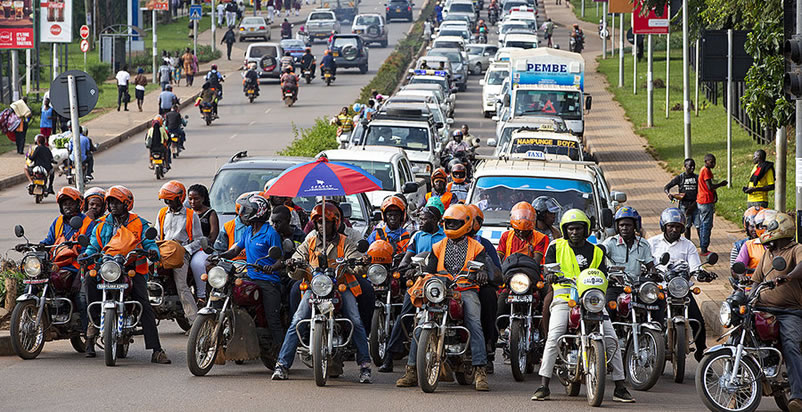By Apollo Mukhwana
At every corner of Uganda, you will find the Blue Stripped Mini Buses commonly known as Taxis which carry a minimum of fourteen passengers (I say minimum because in some cases and areas people are packed like smatched potatoes to carry over 25 people).
These taxis could be over 20,000 in Kampala alone including unregistered ones according to the International Growth Centre – IGC report on the Informal Transport Reform in Kampala.
In addition to the taxis, are the motorbike taxis commonly known as boda bodas who could be over 200,000 including the unregistered ones in Kampala alone according to IGC, with over 400,000 members.
The majority of the operators of taxis and boda bodas are not owners of these automobiles but work on a daily target basis as assigned by the owners. Taxis operators work on a daily target basis of between 80,000/- to 100,000/-. While the boda boda operators work on daily target of between 10,000/- to 15,000/-.
Kampala is a heavily congested city, and its current transport infrastructure is inadequate. With the help of the IGC, Jit Bajpai, a seasoned urban transport economist, met with stakeholders for transport in Kampala to discuss the reform process, and how the formalisation of the transport system can be successfully carried through. Recommendations included the creation of a metropolitan-level governing body for transport in Kampala, and adopting an incremental, long-term approach to improving transport in the city.
In many African cities like Kampala, public transport is rudimentary. City authorities in Kampala have not introduced any formal mass public transportation system to date. These forms of transport are unregulated and are inefficient at getting Kampalans around – neither form can take many passengers per vehicle, and so contribute to the high congestion in the city.
In particular, taxis mostly lack any formal predetermined routes and stop at any point a passenger wants to enter or exit. No one likes traffic, but as well as making the city centre less pleasant, traffic means less time at work for those who commute into the city for their jobs, and adverse health effects from air pollution.
There have been various attempts by private operators in the past to introduce larger buses to bolster Kampala’s public transport. Although these do run in the city, their fleet and their routes remain limited.
Decisive leadership from Kampala’s authorities is needed, as well as a sound understanding of success stories from other cities that have transformed their transport infrastructure, like Bogota, Colombia.
Thus, with the help of the IGC, Jit Bajpai, a seasoned urban transport economist, engaged with stakeholders to discuss the reform process for transport in Kampala. Out of these discussions emerged two key messages.
Firstly, as Kampala’s authorities look towards the introduction of a higher capacity transport system, there remains a distinct lack of metropolitan-level coordination of transport. People live and work across various jurisdictions within and around Kampala, thus the first step towards building a transport system that works for the whole city and its metropolitan area is a governance framework that can work easily across these jurisdictions.
Secondly, it is vital that the city government approaches the reform process for transport in Kampala with incremental change in mind, rather than go for costly large ventures straight away. For example, to maximise the effectiveness of potential future bus routes, traffic management and enforcement measures could be improved along existing public transport corridors.
Do you have a story or an opinion to share? Email us on: dailyexpressug@gmail.com Or follow the Daily Express on X Platform or WhatsApp for the latest updates.

